Current Events :











Analysts said that the disengagement process promises to be a lengthy affair
The two countries have successfully disengaged and pulled back troops from the Galwan Valley, where 24 soldiers were killed, and Pangong Tso, a cross-border lake, in the Ladakh region.
But the two countries have yet to resolve other “friction points”, where troops and weaponry remain, with the latest round of talks seeing a “detailed exchange of views” on disengagement at the Gogra, Hot Springs and Demchok areas but no breakthrough.
No joint statement was released after the 11th round of talks, which took place last Friday (April 9), over a month after the previous round of talks.
Talks are set to continue, with China’s People’s Liberation Army in a statement saying that India should “cherish the current positive trend of de-escalation and cooling in the border areas”.
The Indian defence ministry said that “the two sides agreed on the need to resolve the outstanding issues in an expeditious manner” and jointly maintain stability on the ground.
India and China have since the 90s successfully followed a policy of delinking border troubles from the rest of their relationship. This led to a robust economic relationship, with China becoming India’s biggest trading partner.
But this balance was disrupted by last year’s border trouble, the worst in four decades.
India banned 59 Chinese apps, including TikTok, citing security reasons, and put investments from China through additional scrutiny.
Analysts said that the disengagement process promises to be a lengthy affair, with little hope of reducing the trust deficit at present or seeing some forward movement in ties.
“I think the trust deficit is as wide as it was last year. I don’t think it will go down without a dramatic shift. The temperature has come down and imminent conflict is gone. And there is a certain space that India and China have for diplomatic engagement,” said Professor Harsh Pant, director of studies at the Observer Research Foundation in New Delhi.
“The realistic understanding is that it (border resolution) is not going to happen any time soon. It would require a degree of patience. India is going into this negotiation with eyes open. There is a sense this is a challenge and that the broader relationship with China is also going to be a challenge.”
The border troubles with China also resulted in New Delhi throwing off any hesitancy in embracing the Quadrilateral Security Forum, which groups India, the US, Australia and Japan. India last year invited Australia to be part of the annual Malabar exercises with the US and Japan.
Some analysts believe the border talks need to be seen in a larger context. Professor Srikanth Kondapalli, a China expert at Jawaharlal Nehru University, said there could be a potential go-slow approach by China against the backdrop of the Quad leaders’ summit in March.
At the summit, the group agreed to cooperate in a range of areas, including vaccine manufacturing. China sees the Quad as a grouping that aims to keep it in check.
Prof Kondapalli said: “The geopolitical issues are linked as far as China is concerned. In the light of the Quad meeting, it appears the disengagement process is going to be slow.
“If border talks continue like this, there won’t be much forward improvement in bilateral relations because the Indian side has categorically said there needs to be disengagement first.”

Russia and India are committed to adhering to timelines and other obligations under the S-400 missile deal, Russian ambassador Nikolay Kudashev said on Wednesday amid apprehensions of possible US sanctions against New Delhi over procurement of the weapons systems.
The envoy also said that both Russia and India do not recognise bilateral sanctions as they are “illegal tools” of “unlawful and unfair” competition and pressure.
During his visit to India last month, US Defence Secretary Lloyd Austin said there was no discussion with Defence Minister Rajnath Singh on the possibility of American sanctions against India over its S-400 deal with Russia as there has been no delivery of the missiles.
At the same time, Austin urged all allies and partners of the US to avoid buying Russian equipment that may invite US sanctions.
“Together with India, we do not recognise bilateral sanctions as they are illegal tools of unlawful and unfair, should I say, competition, pressure and even blackmail. It was clearly stated by the two foreign ministers in the course of their exchange,” Kudashev said.
“With regard to S-400 and broader agreements, both sides are committed to the agreed timelines and other obligations. This contract is being successfully fulfilled,” he added.
The US has already imposed sanctions on Turkey under the Countering America’s Adversaries Through Sanctions Act (CAATSA) for purchase of S-400 missile defences from Russia.
Kudashev also said that the world order should be free from “unilateral approaches, illegal sanctions, double standards” and interference in domestic affairs of sovereign states.
“Collective international law based solutions should prevail over zero-sum games,” he said, in his initial statement.
Ahead of Austin’s high-profile India visit, Senator Robert Menendez, Chairman of the powerful Senate Foreign Relations Committee, in a letter urged the US Defence Secretary to take up with Indian leaders the issue of New Delhi procuring Russian S-400 missile defence system.
In October 2018, India had signed a USD 5 billion deal with Russia to buy five units of the S-400 air defence missile systems, despite a warning from the Trump administration that going ahead with the contract may invite US sanctions.
India made the first tranche of payment of around USD 800 million to Russia for the missile systems in 2019. The S-400 is known as Russia’s most advanced long-range surface-to-air missile defence system.
Following the US sanctions on Turkey, there have been apprehensions that Washington may impose similar punitive measures on India.
The supply of S-400 missiles to India by Russia is expected to begin later this year.
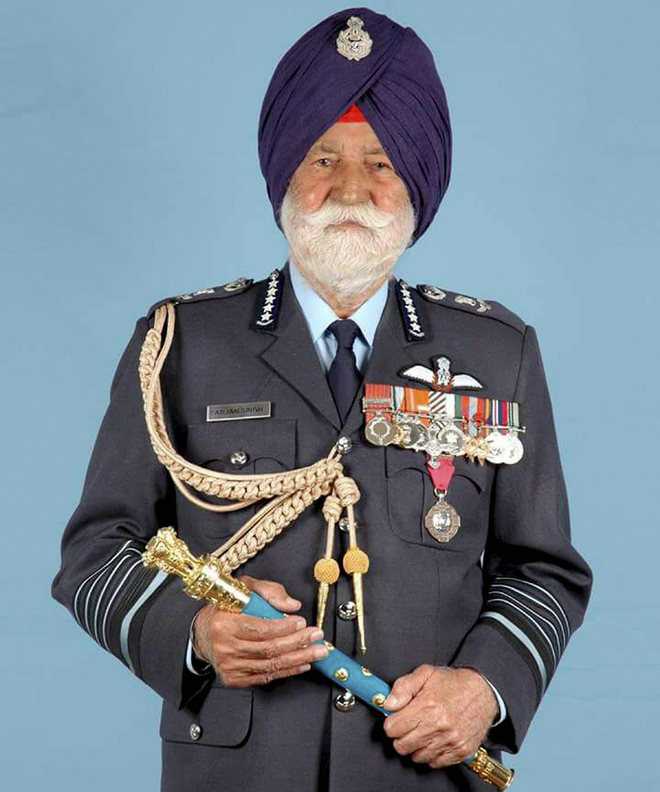
Atall, handsome Sardar sporting a milky-white beard, wearing an Air Force uniform with five stars on the lapel, marched up to President KR Narayanan with a sure stride. He belied his 83 years and stood straight before the Supreme Commander of the Indian armed forces on April 22, 2002. Marshal of the Indian Air Force Arjan Singh’s investiture ceremony took place at the 32-metre-by-20-metre Ashoka Hall in Rashtrapati Bhavan, New Delhi.
‘His inspiring career, towering personality and distinguished reputation have endowed him with a unique stature in society and have earned him the respect of the nation. Even till date, he actively associates himself with various welfare activities of the Air Force as a father figure of the service, which he nurtured from its fledgeling days.
‘For his most outstanding and extraordinary service to the nation, the President of India is pleased to confer upon Air Chief Marshal Arjan Singh the rank of Marshal of the Indian Air Force,’ read the citation.
The President acknowledged the salute of the veteran warrior. The cerulean and gold baton was brought up on a velvet cushion. The President handed the baton to Marshal of the Indian Air Force Arjan Singh, who saluted him again. The President shook his hand.
The lady of the day, Teji Arjan Singh, looked elegant in a russet organza sari. She has stood by her husband for all the eventful years with grace and charm that became legendary. Sitting next to her in a white embroidered outfit was their daughter, Asha. The National Anthem was played again and the President and his guests retired to the Banquet Hall.
The ceremony had been as impressive as it was brief. During tea at the Banquet Hall, adjoining Ashoka Hall, the mood was informal. Life-size portraits of past Presidents seemed to look upon the historical event approvingly as many of his well-wishers greeted MIAF Arjan Singh. The President and others gracefully conceded the centre stage to the 83-year-old pilot, who proudly wore the Distinguished Flying Cross, Padma Vibhushan, and a host of other medals.
A comment he had made soon after the announcement of the rank on January 26 that year is still fresh in my mind: ‘Roopinder, I will finally get rid of that ‘retired’!’ After leaving active service in IAF, he had a distinguished career in diplomacy and public service, but IAF was his life.
Personal sacrifice demonstrates leadership. Two years later, he sold his farm near Delhi. With the support of the family, a corpus of Rs 2 crore was used to establish the Marshal of the Air Force & Mrs Arjan Singh Trust. It provides assistance to ex-Air Force personnel/their widows. After his death, his children gave Rs 25 lakh more for the trust.
A Field Marshal never retires. MIAF Arjan Singh DFC was an extraordinary human and one who led by example. A salute to IAF’s only Field Marshal on his birth anniversary. He would have been 102 today. He continues to inspire us.
Imran’s rigidity a hurdle in the way of maintaining peace on our borders
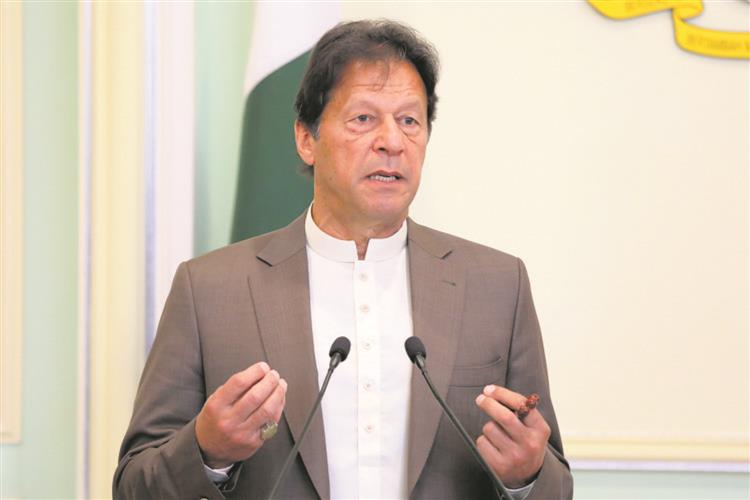
n a bind: India is dealing with one of the most opinionated politicians in Pakistan — Imran Khan. Reuters
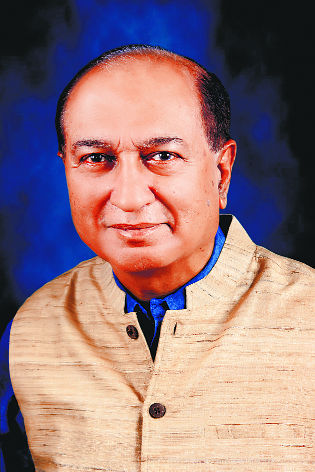
Tensions with Pakistan have been a continuing feature of India’s problems in its neighbourhood. Are we, however, seeing after a long time, the emergence of a ‘Naya Pakistan’, with its perennially hostile military, favouring a cooling of tensions with India? There has been a feeling in recent days that there are good reasons for cautious optimism in India and Pakistan that the two countries could negotiate ways to live in peace. Most Indians feel that for the past four years, India is dealing with one of the most opinionated politicians in Pakistan — Imran Khan. His Tehreek-e-Insaf Party was ideologically moulded by the anti-India, former ISI chief, Lt Gen Hamid Gul.
China has naturally regarded Imran Khan’s anti-India diatribes as a blessing. It complements the daily dose of anti-India rhetoric dished out by Beijing’s official mouthpiece, the Global Times. All this is having an impact within Pakistan, where there are many who understand the urgent need for economic realism to meet challenges posed by the pandemic. Pakistanis would surely have noted that while their foreign exchange reserves have dwindled to a mere $14.8 billion, Bangladesh, whose people have traditionally been looked down upon by their erstwhile West Pakistani brethren, has steadily growing foreign exchange reserves of $44 billion. Bangladesh has overtaken Pakistan in virtually every financial, social and economic indicator, within half a century of its birth in 1971.
There are now many in Pakistan who believe that it is imperative to focus on economic development with their neighbours. Pakistan army chief General Bajwa, who, like his predecessors, is Pakistan’s de facto ruler, called for measures to boost intra-regional trade and connectivity. A few days earlier, the DGMOs of India and Pakistan had reached an agreement on a ceasefire across the LoC. Meanwhile, the economic coordination committee of Imran Khan’s cabinet, headed by Finance Minister Hammad Azar, recommended that trade with India needed to be resumed to revive the economy.
The cabinet rejected the recommendations of the committee the very next day. Those leading the rejectionists included minister for human rights Shireen Mazari, who has a track record of vitriolic anti-Indian writings and pronouncements, SM Qureshi, the hawkish minister for foreign affairs, and Sheikh Rashid, the interior minister. Mazari asserted: ‘The cabinet stated clearly that there could be no trade with India. The Prime Minister made it clear there can be no normalisation of relations with India, until they reverse their illegal actions of August 5, 2019, on Jammu and Kashmir’. Imran Khan appears determined to ridicule what was an action to cool temperatures in relations with India, initiated by General Bajwa. He was, thereby, sending the message that he remained a ‘hawk’ on J&K. This will, no doubt, please Bajwa’s rivals in the army, who reportedly include the ISI chief, Lt Gen Faiz Hameed, who is in the running to succeed Bajwa. The ISI chief is, no doubt, pledging eternal loyalty to the army chief at the same time.
While his actions may have enabled Imran Khan to strengthen his position amongst those opposed to General Bajwa, he could well find that he has opened the doors for his political opponents like Asif Ali Zardari of the PPP and Maulana Fazlur Rahman of the JUI, who has conservative, Islamist support within Pakistan, to pose a serious political challenge. Imran Khan remembers that in his early days in politics, he had the strong army support to pose challenges to his then rival, Nawaz Sharif. Even as his present relations with General Bajwa are not as cordial as they were earlier, he is making sure that he retains support in the higher echelons of the army. He is, at the same time, working to convince US President Joe Biden that he will facilitate a smooth withdrawal of US forces from Afghanistan, while remaining a trusted loyalist of Presidents Vladimir Putin and Xi Jinping. Both China and Russia have their eyes on Afghanistan’s immense resources.
India needs to play its cards skilfully in this complex scenario. National Security Adviser Ajit Doval, who was posted in our embassy in Islamabad in the early 1980s, developed a perceptive understanding of the complexities of the internal situation in Pakistan. The two countries should have ambassadors in each other’s capital as a first step, for any move forward. It is only natural for Doval to continue guiding any ‘back channel’ negotiations. India’s highly respected, former High Commissioner to Pakistan, Satinder Lambah, did a commendable job as Special Envoy in his ‘back channel’ meetings with General Musharraf’s confidant, Tariq Aziz, after the 2003 Kashmir ceasefire. That entire dialogue process was undermined by Gen Ashfaq Kayani, who succeeded Musharraf as army chief. Imran Khan would be well advised to study details of those talks, instead of shooting from the hip. That dialogue was based on then PM Manmohan Singh’s simple proposition: ‘Borders cannot be redrawn, but we can work towards making borders irrelevant — towards making them just lines on a map’. He added: ‘People on both sides of the Line of Control should be able to move freely and trade with one another’.
The way ahead for maintaining peace on our borders is going to the complex. One hopes that the Biden administration will show wisdom and foresight by ending sanctions on Iran. Teheran has a vital stake in seeing that its eastern borders with Afghanistan are not administered by ISI-backed, Wahhabi-oriented fundamentalists. Democratic processes can be revived in J&K with the revival of statehood for the Jammu region and the Kashmir valley, when the situation stabilises. Pakistan will have to be cautioned by those desiring peace and stability against any effort to resume infiltration across the LoC. This process can also be facilitated if China ends its efforts for ‘salami slicing’ of Indian territory in Ladakh.
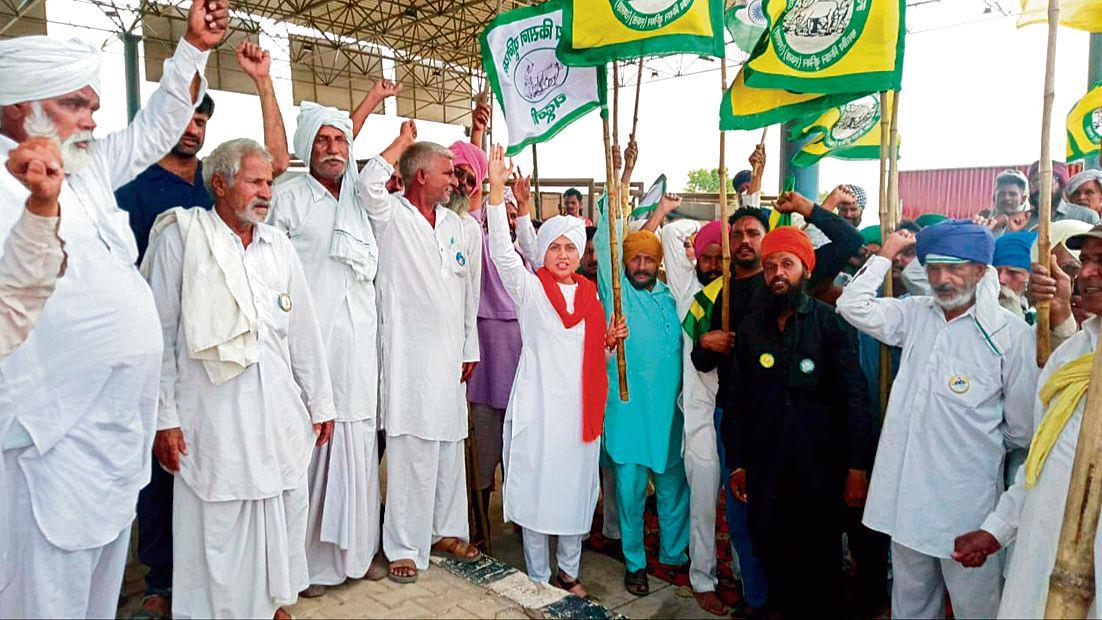
Farmers raise slogans at Aasoda toll plaza in Jhajjar. Tribune Photo
Ravinder Saini
Tribune News Service
Jhajjar, April 14
The administration’s move to reactivate the toll booth on the Kundli-Manesar-Palwal (KMP) expressway near Aasoda village failed within 24 hours as protesting farmers created a ruckus on Wednesday, forcing toll officials to stop charging tax from commuters. This was for the third time in four months that farmers shut the KMP Expressway toll plaza.
The protesting farmers lifted the toll barriers, giving a free passage to the commuters. They also staged a dharna at the plaza and raised anti-government slogans. Bahadurgarh SDM Hitendra Sharma, present on the spot along with a heavy police force, said the farmers were requested not to take law into their hands by closing the toll plaza but they did not pay heed.
The toll plaza was restarted on Tuesday in the presence of the SDM and the police to prevent any untoward incident. The farmers did not come yesterday as they had got together at Tikri border for the Baisakhi fair, said sources.
BKU leader Gurnam Singh Chaduni had appealed this morning to farmers to reach the Aasoda toll plaza to ensure its closure in a peaceful manner. Suman Hooda, a farmer leader, said they would not leave the toll plaza till the administrative officers and police forces remained at the spot.
Meanwhile, the All India Kisan Sabha (AIKS) condemned the toll companies for restarting the collection. “These are provocations to disrupt the stir when harvesting is at its peak,” the AIKS said.
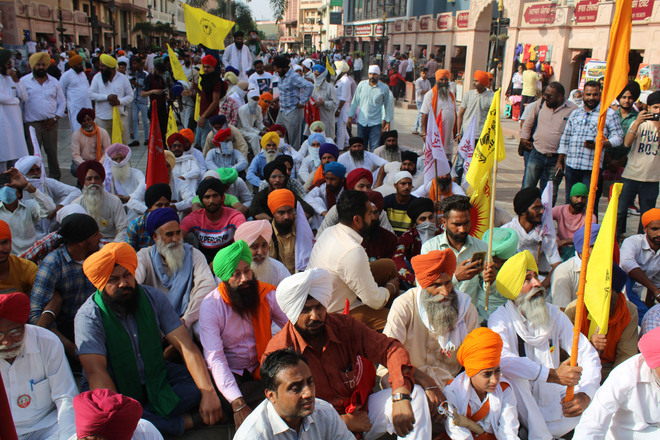
Tribune News Service
Amritsar, April 13
Farmers under the banner of the Sanyukt Kisan Morcha paid tributes to the martyrs of Jallianwala Bagh massacre by organising a gathering on road outside the memorial, which was closed in February last year for renovation.
The farmer leaders said 102 years ago, the British government killed hundreds of peaceful protesters who had gathered to protest against them. The farmers said the present government at the Centre was moving on the same lines as over 350 farmers have died during the ongoing protests at Delhi borders but it had failed to accept the justified demands of the farming community.
The leaders exhorted farmers to take inspiration from the martyrs of Jallianwala Bagh massacre and continue the protest till the three controversial laws were repealed. The farmer organisations also criticised the government’s plan of setting up a ticket counter outside the memorial. They said people would launch another agitation if the government did not abandon its plan to set up the ticket counter.
Leading the protest, farmer leader Balkar Singh Dudala said: “Like the British government, the present rulers, too, are working against the common masses.” He said the three agriculture laws would destroy the farming community and benefit the corporate.
Another leader Rattan Singh Randhawa said: “The farmers’ protest at Delhi borders will soon complete five months. The government is indifferent and focused more on elections. Any sensitive government would have by now addressed the issues of the agriculture sector.” He said the protest would continue till the demands of farmers were accepted. Others who addressed the gathering included Davinder Singh Chattiwind, Harjit Singh Jheeta, Mehtab Singh Sirsa, Bachittar Singh, Hoshiar Singh Jhander and others.
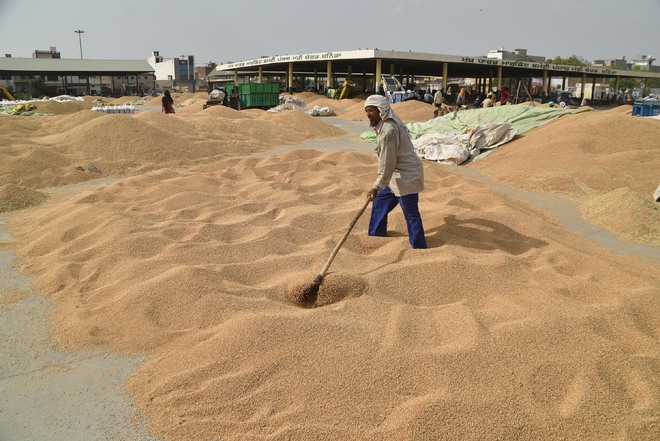
A labourer spreads wheat at the Bathinda grain market. Tribune photo
Bathinda, April 14
Farmers under the banner of BKU (Mansa) faction staged a protest at Goniana Kalan in Bathinda district alleging the FCI had not started wheat procurement there so far.
The protesting farmers raised slogans against the Centre and the FCI. They said the central procurement agency had dragged its feet from around six mandis in the district on the pretext of high moisture content. Farmers blocked Bathinda-Amritsar highway and also raised slogans against the state government.
Union leader Jagshir Jeeda said, “This is a deliberate attempt by the central procurement agency to pester farmers who have brought their produce to the mandi. No one is available here to buy their produce. This approach of FCI won’t be tolerated and if the procurement does not start soon, we will intensify the stir.”
Later, Naib Tehsildar Rajvir Singh reached the protest venue and placated the farmers following which the dharna ended. — T
The results showed that inactivity is strongly associated with poor Covid-19 outcomes

Regular exercise or a 30-minute brisk walk in the neighbourhood park or in your society five days a week while following the social distancing norms can improve your chances of beating Covid-19, reveals a significant study that analysed 48,440 adults who were Covid positive.
On the other hand, patients who were consistently inactive had 1.73 times greater chances of ICU admission, while the risk for death was 2.49 times greater for patients who were consistently inactive.
Other than being over the age of 60 or having a history of organ transplant, being consistently inactive conferred the highest risk for death from Covid-19.
Even patients who were inconsistently active had lower chances for severe Covid-19, suggesting any amount of physical activity has benefit, revealed the findings published in the British Journal of Sports Medicine.
“This is a wake-up call for the importance of healthy lifestyles and especially physical activity,” said Robert E Sallis, physician at the Kaiser Permanente Fontana Medical Centre in the US.
“People who regularly exercise had the best chance of beating Covid-19, while people who were inactive did much worse,” Sallis added.
For the study, the team identified 48,440 adults with a Covid-19 diagnosis from January 1, 2020, to October 21, 2020.
They found 6.4 per cent were consistently active and 14.4 per cent were consistently inactive, with the remainder falling in the inconsistently active category. Among all Covid-19 patients, 8.6 per cent were hospitalised, 2.4 per cent were admitted to the ICU, and 1.6 per cent died.
“What surprised me the most from this study was the strength of the association between inactivity and poor outcomes from Covid-19,” said Deborah Rohm Young from the Kaiser Permanente Southern California.
“Even after we included variables such as obesity and smoking in the analysis, we still saw inactivity was strongly associated with much higher odds of hospitalisation, ICU admission, and death compared with moderate physical activity or any activity at all,” Young added.
The results showed that inactivity is strongly associated with poor Covid-19 outcomes, Sallis said, while suggesting walking 30 minutes a day, five days a week at a moderate pace, to prevent Covid-19.
“Exercise is medicine that everyone should take — especially in this era of Covid-19,” Sallis said. — IANS
Over 800 Indian Sikhs travelled to Pakistan to attend the Baisakhi festival
New Delhi/Lahore, April 14
India is in touch with authorities in Pakistan regarding safety of over 800 Indian pilgrims whose visit to the neighbouring country has been affected by violent protests in several cities, including Lahore.
“Closely tracking developments. In touch with Pakistani authorities and Sikh Jatha. Will do utmost to ensure security and safe return of pilgrims,” External Affairs Minister S Jaishankar tweeted.
The minister’s response came after president of Delhi Sikh Gurdwara Management committee Manjinder Singh Sirsa, in a tweet, requested Jaishankar to look into the matter of stranded Sikh pilgrims in Pakistan.
Over 800 Indian Sikhs travelled to Pakistan to attend the Baisakhi festival. The Indian pilgrims had reached Lahore via Wagah border on Monday to attend the festival.
On Tuesday afternoon, the visiting Indian Sikhs left for Gurdwara Panja Sahib in Hassanabdal in 25 buses which were escorted by the police and the Pakistani Rangers.
“Owing to the TLP protest that blocked roads, the Sikh yatrees reached Hassanabdal at 4 am on Wednesday after over 14 hours of journey which otherwise is covered in three hours,” an official of the Punjab government told PTI in Lahore.
Protests are taking place in several parts of Pakistan by supporters of Tehreek-i-Labaik Pakistan (TLP) demanding the expulsion of the French envoy over the publication of blasphemous caricatures in France.
The Indian pilgrims attended the main event on Wednesday in which several local Sikhs also participated.
The visiting pilgrims are scheduled to visit other holy places in the Punjab province of Pakistan during their 10-day stay in the country. PTI



























































